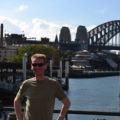Visiting faculty testimonial: Tonny Brems Knudsen
Read Erasmus Mundus scholar Tonny Brems Knudsen's report on his scholarship visit from Aarhus University to the University of Technology, Sydney, in April 2014.

Dr Tonny Brems Knudsen, Associate Professor, Aarhus University, Denmark
I presented my research on international relations to students and staff in two lectures ... Needless to say, my [political science] approach to these subjects is different from the ones taken in journalism and media science, but there is also a substantial overlap, and I found the discussions with students and members of staff to be very stimulating.
In April 2014 I spent two weeks at the Australian Center for Independent Journalism, Faculty of Arts and Social Sciences, University of Technology Sydney. This was made possible by a Mundus scholarship from the Centre for University Studies in Journalism, Aarhus University.
The purpose of my visit to the UTS was to meet the people at the Center for Independent Journalism and the Faculty, especially those who are involved in the cooperation with Aarhus University and the Danish School of Media and Journalism on the Erasmus Mundus Master in Journalism, Media and Globalisation. More specifically, I wanted to learn more about the course programme at the UTS, to offer lectures to students and staff, and to explore mutual research agendas.
My own academic background is Political Science and International Relations, and my expertise includes world order, world organization (especially the United Nations), international law, military intervention and the relationship between established and rising great powers. In the Mundus Master in Journalism, Media and Globalisation at Aarhus University I teach these subjects in the course on “Globalisation and World Order” which I have been involved in since 2008.
On this basis, I agreed with Tom Morton, director at the Australian Center of Independent Journalism, that I was going to present my research on international relations to students and staff in two lectures. The lectures were based on three of my most recent articles which I circulated to the organizers along with my power point presentations. The first lecture was given to the students in Dr. Steve Marshall’s postgraduate course on “International and Comparative Journalism”. The subject of the lecture was “Humanitarian Intervention and the Responsibility to Protect in a New World Order: Libya, Côte d’Ivoire, Syria, and Mali”. As indicated the idea was to present the changing world order and great-power and regional politics to the students with a focus on the political and military protection of minorities, and to show how these goals and principles have led to very different outcomes in the mentioned cases.
This was also the theme of my second lecture “Humanitarian Intervention and the Responsibility to Protect in a New World Order: Great Power Relations and Regional Ownership” which was given to the academic staff at the Center of Independent Journalism and the Faculty of Arts and Social Sciences, but as indicated by the subtitle this lecture had a stronger focus on the Third World. It also dealt with the importance of the media in triggering or affecting national and international decisions on military intervention and the responsibility to protect. Needless to say, my approach to these subjects is different from the ones taken in journalism and media science, but there is also a substantial overlap, and I found the discussions with students and members of staff very stimulating.
So were a number of meetings with Tom Morton, Catriona Bonfiglioli and Helen Vatsitkopoulos among others. Their research interests include topics like military intervention, the responsibility to protect, genocide and genocide prevention, international humanitarian law and great-power politics. The overlapping research interests were also clear when Helen Vatsitkopoulos came to Aarhus University on a similar scholarship in late April. Here she visited the Department of Political Science and this led to the involvement of the UTS Center for Independent Journalism in a departmental research application to the Danish Research Council on a project on international support to oppositional forces in war-torn countries. I look forward to continuing research cooperation and joint ventures like this in the future.